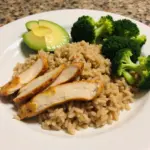Soft tissue injuries, encompassing sprains, strains, and bruises, are common occurrences. While rest, ice, compression, and elevation (RICE) are crucial for initial management, your diet plays a significant role in the healing process. Knowing which foods to avoid after a soft tissue injury can significantly impact your recovery time and minimize inflammation.
Understanding the Impact of Diet on Soft Tissue Injury Recovery
Inflammation is the body’s natural response to injury. However, excessive or prolonged inflammation can hinder the healing process. Certain foods can exacerbate inflammation, slowing down tissue repair and increasing pain. By avoiding these inflammatory foods, you can create a more conducive environment for healing.
Foods to Avoid After a Soft Tissue Injury
Sugary Drinks and Processed Foods
Sugary drinks and processed foods are often loaded with refined carbohydrates and unhealthy fats. These can trigger inflammation and hinder the body’s ability to repair damaged tissues. Opt for whole, unprocessed foods instead.
Red Meat and Saturated Fats
While red meat can be a good source of protein, excessive consumption, especially of processed red meats, can contribute to inflammation. Limit your intake and choose lean protein sources like fish and poultry. Saturated fats, found in fried foods and some dairy products, can also increase inflammation.
Alcohol
Alcohol can interfere with the healing process by dehydrating the body and hindering the absorption of essential nutrients needed for tissue repair. It’s best to avoid alcohol altogether during the recovery period.
Foods High in Omega-6 Fatty Acids
While Omega-6 fatty acids are essential, an imbalance between Omega-6 and Omega-3 can promote inflammation. Limit your intake of foods high in Omega-6, such as corn oil, sunflower oil, and some processed snacks.
Foods with High Glycemic Index (GI)
High GI foods cause a rapid spike in blood sugar, which can contribute to inflammation. Examples include white bread, white rice, and sugary cereals. Choose low GI options like whole grains and brown rice.
Promoting Healing Through Nutrition
Focus on Anti-Inflammatory Foods
Focus on incorporating anti-inflammatory foods into your diet, such as leafy green vegetables, berries, nuts, and fatty fish rich in Omega-3s.
Hydration is Key
Staying hydrated is crucial for tissue repair. Drink plenty of water throughout the day.
Prioritize Protein Intake
Protein is essential for building and repairing tissues. Include lean protein sources in your meals.
“Proper nutrition is just as important as rest and physical therapy in the recovery process,” says Dr. Michael Nguyen, a sports medicine physician. “By avoiding inflammatory foods and focusing on nutrient-rich options, patients can significantly reduce healing time and improve outcomes.”
Why Choosing the Right Foods Matters
Choosing the right foods can expedite the healing process, reduce pain and swelling, and improve overall recovery outcomes. By making conscious dietary choices, you can actively contribute to your body’s ability to heal.
Conclusion
Soft tissue injuries require careful attention to diet to minimize inflammation and promote healing. By avoiding foods that exacerbate inflammation and prioritizing nutrient-rich options, you can significantly impact your recovery time and get back to your normal activities sooner. Remember that consulting with a healthcare professional or registered dietitian can provide personalized dietary guidance tailored to your specific needs. By making informed choices about your diet, you can support your body’s natural healing process and achieve optimal recovery after a soft tissue injury.
FAQs
- How long should I avoid these foods after a soft tissue injury?
- Can I take supplements to aid in the healing process?
- What are some good sources of protein for soft tissue injury recovery?
- Are there any specific foods I should focus on eating?
- How does hydration affect soft tissue healing?
- Can dietary changes completely eliminate the need for medical treatment?
- What are the signs that my soft tissue injury is healing properly?
Need Further Assistance?
For personalized travel arrangements in Hanoi and beyond, contact TRAVELCAR:
Phone: 0372960696
Email: [email protected]
Address: 260 Cau Giay, Hanoi
Our 24/7 customer service team is ready to assist you with airport transfers, private tours, and comfortable vehicle rentals (16, 29, and 45 seaters). Explore Hanoi’s hidden gems with TRAVELCAR.

